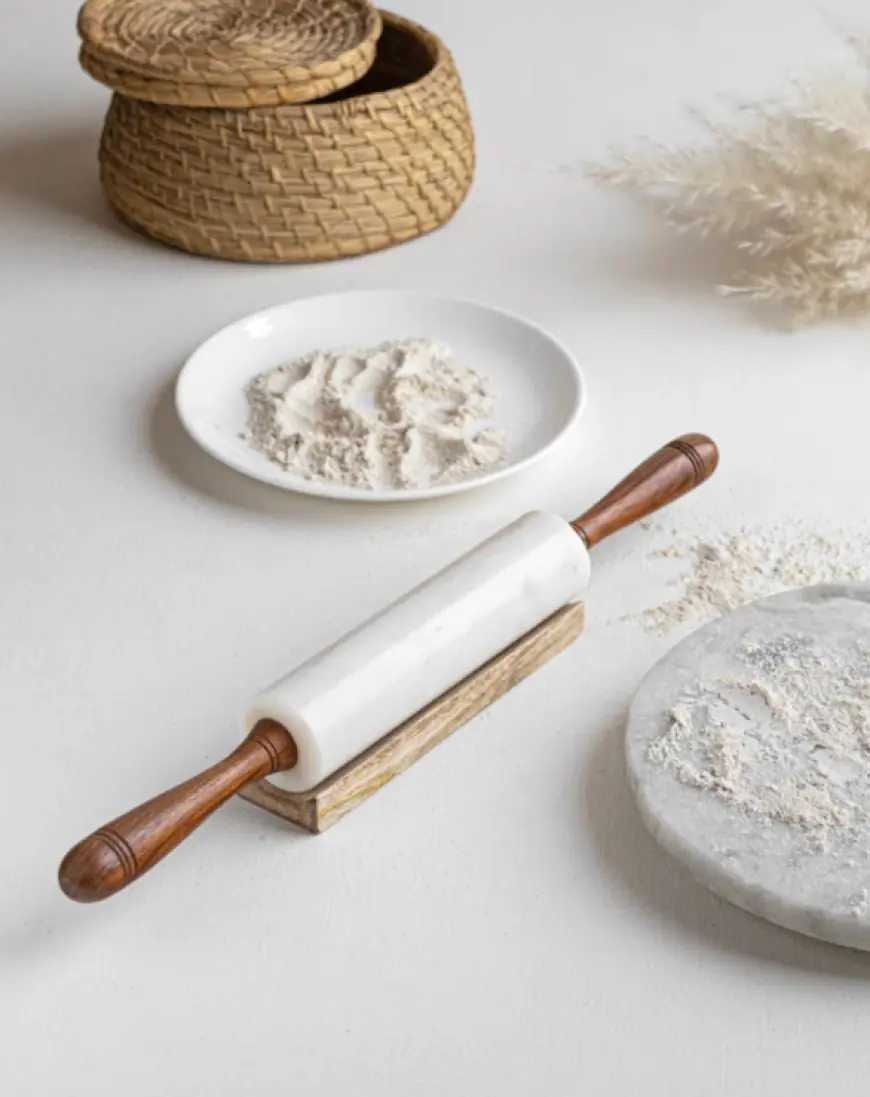Benefits of Using Marble Chakla Instead of Wooden or Steel Alternatives

In Indian kitchens, the chakla (rolling board) is an indispensable item used daily for making chapatis, parathas, and other flatbreads. While wooden and steel versions have been commonly used for decades, a growing number of households are now turning to marble chaklas—and for good reason. With their natural elegance, durability, and hygiene-friendly qualities, marble chaklas are not just a trend but a smart kitchen upgrade. Let’s explore the many benefits of choosing a marble chakla over wooden or steel alternatives.
1. Aesthetic Appeal Meets Practical Function
The first and most noticeable difference is appearance. Marble chaklas are visually stunning and bring a touch of luxury to even the simplest kitchens. Their natural veins and smooth surface make them far more aesthetically pleasing than wooden or steel boards. Pairing a Marble Rolling Pin With Marble Chakla not only adds uniformity but enhances your kitchen décor as well. This set becomes a centerpiece, offering beauty along with functionality.
But it’s not just about looks. Marble chaklas are heavy, which keeps them stable on the countertop. Unlike wooden or steel chaklas that might slip or wobble, marble boards stay firmly in place while you roll, making the process smoother and more efficient.
2. Superior Durability and Long-Term Investment
Marble is a natural stone, and with proper care, a marble chakla can last a lifetime. Unlike wood, it doesn’t warp, crack, or absorb moisture over time. Steel, though sturdy, can dent or lose its finish. This is where a Marble Rolling Pin With Marble Chakla set truly excels—it resists wear and tear while maintaining its pristine look.
Furthermore, marble is resistant to stains and retains its polish over time, which means the chakla remains sleek and easy to use for years. It’s also immune to termites and pests, a common issue with wooden boards, making marble a hygienic and safer choice in the long run.
3. Naturally Cool Surface Ideal for Dough Work
One of the most practical reasons to switch to marble is its temperature. Marble stays naturally cool, which is excellent for dough preparation. Heat tends to make dough sticky and difficult to manage, especially in hot climates. A marble surface helps keep the dough firm and smooth.
When using a Marble Rolling Pin With Marble Chakla, you get double the cooling effect—both the rolling surface and the rolling pin help prevent the dough from sticking, reducing the need for excess dry flour. This results in softer chapatis and neater workspaces. It’s a game-changer for those who make roti daily or love baking.
4. Hygiene and Easy Maintenance
Maintaining hygiene in food preparation is crucial, and marble excels here too. Unlike wood, which can harbor bacteria in its porous surface, or steel, which can react with acidic foods, marble is non-porous and non-reactive. This means no unwanted flavors, smells, or microbial build-up.
Cleaning a marble chakla is incredibly easy. A quick wipe with a damp cloth is enough to remove flour and dough residues. When combined with a Marble Rolling Pin With Marble Chakla, you get an entirely low-maintenance set that doesn’t require frequent scrubbing or special care—making it perfect for busy households.
5. Environmentally Friendly and Chemical-Free
Choosing marble also means opting for a more natural and eco-friendly material. Marble chaklas are typically carved from single blocks of stone without the use of harmful chemicals or industrial processing. Wooden boards, depending on their finish and origin, may contain adhesives or chemical treatments. Steel requires intensive manufacturing and often comes coated with polishes that degrade over time.
By investing in a Marble Rolling Pin With Marble Chakla, you're choosing a cleaner, greener, and more sustainable kitchen tool that doesn’t harm the environment and is safe for daily food preparation.
6. Perfect Weight for Rolling and Stability
Weight plays a crucial role in rolling dough effectively. Marble chaklas offer just the right heaviness to stay steady, which improves control during rolling. Lightweight wooden or steel chaklas often need constant repositioning, which can interrupt your flow.
This balanced weight also complements the Marble Rolling Pin With Marble Chakla combination. The pin’s solid construction and the chakla’s base allow even pressure distribution, resulting in evenly rolled dough with minimal effort. It’s ideal for both beginners and seasoned cooks alike.
Conclusion: Why Marble Chakla Is a Worthy Upgrade
Switching to a marble chakla is not just about following a trend—it’s a wise investment in better hygiene, performance, and aesthetic appeal in your kitchen. From maintaining dough quality to offering long-lasting durability and eco-friendliness, marble chaklas stand out from their wooden and steel counterparts on multiple fronts.
Whether you're setting up a new kitchen or upgrading old tools, consider adding a marble chakla to your collection. It’s a timeless addition that delivers both form and function—one that you'll appreciate every time you roll out a perfect roti or paratha.
What's Your Reaction?
 Like
0
Like
0
 Dislike
0
Dislike
0
 Love
0
Love
0
 Funny
0
Funny
0
 Angry
0
Angry
0
 Sad
0
Sad
0
 Wow
0
Wow
0
Related Posts
The Top Healthcare Marketing Strategies to Grow Your Cl...
Rankingeek Marketi... Feb 20, 2026 0 9.4k

















































